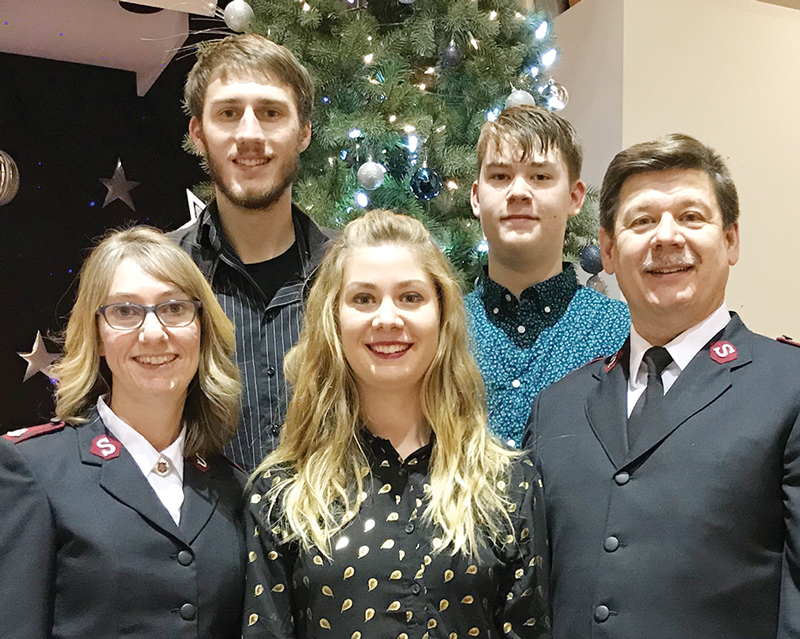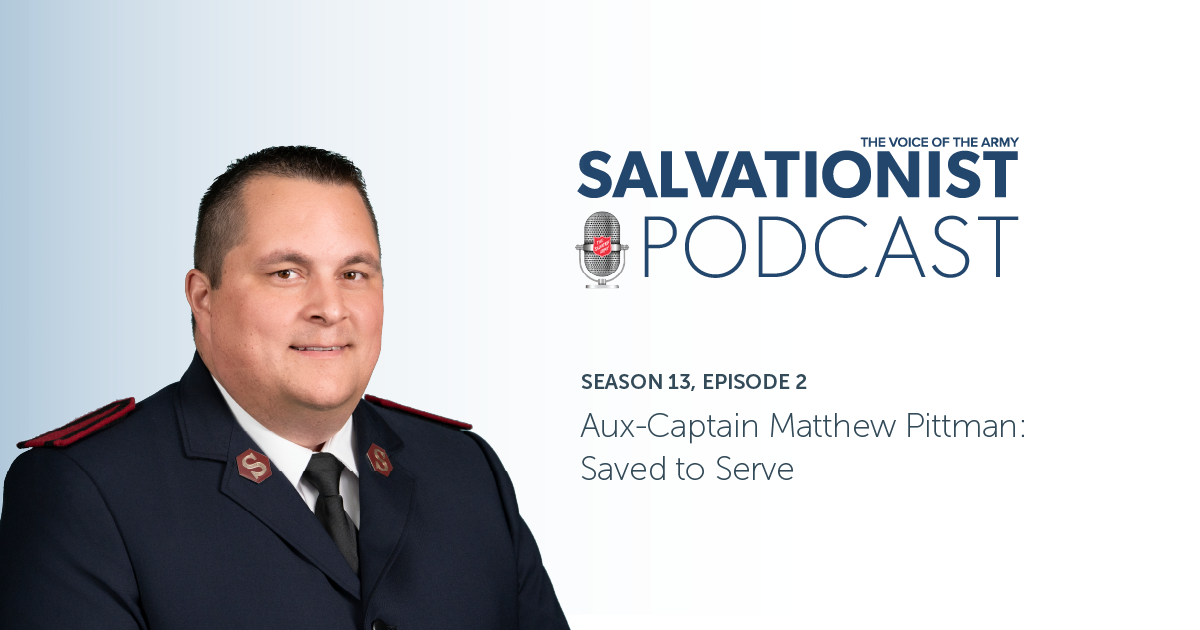"As an officer, you realize very quickly that life is not just what people see on Sunday,” Major Tracy Goyak says. “Between thrift stores and family and community work, we’re always on the go. It’s hard work, but at the end of the day, you feel complete.”
“And at the end of the day, you know who your boss is,” smiles Major Orest Goyak, Tracy’s husband. “In the secular world, bosses come and go, but our boss never changes. God’s always the same; I can trust him and he is always on my side.”
The Goyaks are proud and fulfilled Salvation Army officers serving at Hope Community Church in Saint John, N.B. There was a time, however, when the young couple’s future hinged on two interviews.
“Our Church”
Orest and Tracy met in high school in Thompson, Man. Tracy was born and raised in The Salvation Army while Orest was a Ukrainian Catholic. For both of them, church was an important part of their lives—Tracy taught Sunday school and Orest was in the church choir—so it was natural that they would worship at each other’s church on alternate Sundays.
The couple fell in love and were soon engaged to be married. But where would the couple worship as husband and wife?
“We realized we couldn’t keep hopping from church to church,” says Tracy. “So we decided to interview both the corps officer and the parish priest. Whatever church we decided to attend would be our church.”
Fateful Decision
The couple met with Orest’s parish priest first.
“It seemed very complicated, for me especially,” says Tracy. “The expectation for a person from a Protestant faith background to be married in the Catholic Church was not easy to attain, and there was nothing that suggested to me that I would be accepted for who I was.”
But what concerned Tracy and Orest was that if they decided to get married in The Salvation Army or any other church, in the Catholic Church’s eyes, they would not be married.
The couple went to see their Salvation Army pastor, then Captain Dean Locke.
“At Orest’s church, it was all or nothing,” says Tracy. “At the Army, it was the opposite: We love you and whatever you decide, your marriage will be a union in God’s eyes wherever you get married and you will still be loved by us.”
Without saying a word, Orest and Tracy knew what church they would be happy in for the rest of their lives.
“We both felt at peace and we both felt the same way,” says Tracy. “I didn’t have to convince him and he didn’t have to convince me. While we had great respect for the Catholic Church, we knew that the Army was where we were going to raise our family.”
Symbol of Joy
The couple were married in 1991. Soon after their first son, Nathan, was born in 1993, Orest responded to an altar call for the first time in his life.
“Major Art Oliver was the guest speaker that evening,” says Orest, “and it was like he was talking to just me. I had never been so moved.”
As he knelt at the mercy seat, Orest felt as if heavy weights were lifted from his shoulders. “I felt amazing.”
“Even though Orest was raised in church, he was never taught that you need that personal relationship with Jesus,” explains Tracy. “He got it that evening.”
“For me, I used to see the crucifix every Sunday—Jesus dead on the cross,” says Orest. “The cross should not be a symbol of guilt that God died. But as Salvationists, we feel a sense of hope and joy that the cross is now empty!”
Called to Officership
Soon after, Orest and Tracy became soldiers.
“I'd always been involved in my church but I'd put it off,” says Tracy. “I knew that wearing a uniform was a commitment— you’re in for life. And I realize now I was waiting for Orest.”
A year after they became soldiers, they were accepted to the College for Officer Training.
“We’ve always had the desire to do more than we were doing,” Tracy says, “and not just collect a paycheque.”
“So at the end of the day,” continues Orest, “we knew we would be doing more as officers with our gifts and abilities, and we knew in our hearts that that’s what we were called to do.”
To anyone thinking of becoming officers themselves, Tracy replies, “I would tell them to follow their heart when God pulls at their heartstrings. You won’t be sorry.”
“And at the end of the day, you know who your boss is,” smiles Major Orest Goyak, Tracy’s husband. “In the secular world, bosses come and go, but our boss never changes. God’s always the same; I can trust him and he is always on my side.”
The Goyaks are proud and fulfilled Salvation Army officers serving at Hope Community Church in Saint John, N.B. There was a time, however, when the young couple’s future hinged on two interviews.
“Our Church”
Orest and Tracy met in high school in Thompson, Man. Tracy was born and raised in The Salvation Army while Orest was a Ukrainian Catholic. For both of them, church was an important part of their lives—Tracy taught Sunday school and Orest was in the church choir—so it was natural that they would worship at each other’s church on alternate Sundays.
The couple fell in love and were soon engaged to be married. But where would the couple worship as husband and wife?
“We realized we couldn’t keep hopping from church to church,” says Tracy. “So we decided to interview both the corps officer and the parish priest. Whatever church we decided to attend would be our church.”
Fateful Decision
The couple met with Orest’s parish priest first.
“It seemed very complicated, for me especially,” says Tracy. “The expectation for a person from a Protestant faith background to be married in the Catholic Church was not easy to attain, and there was nothing that suggested to me that I would be accepted for who I was.”
But what concerned Tracy and Orest was that if they decided to get married in The Salvation Army or any other church, in the Catholic Church’s eyes, they would not be married.
The couple went to see their Salvation Army pastor, then Captain Dean Locke.
“At Orest’s church, it was all or nothing,” says Tracy. “At the Army, it was the opposite: We love you and whatever you decide, your marriage will be a union in God’s eyes wherever you get married and you will still be loved by us.”
Without saying a word, Orest and Tracy knew what church they would be happy in for the rest of their lives.
“We both felt at peace and we both felt the same way,” says Tracy. “I didn’t have to convince him and he didn’t have to convince me. While we had great respect for the Catholic Church, we knew that the Army was where we were going to raise our family.”
Symbol of Joy
The couple were married in 1991. Soon after their first son, Nathan, was born in 1993, Orest responded to an altar call for the first time in his life.
“Major Art Oliver was the guest speaker that evening,” says Orest, “and it was like he was talking to just me. I had never been so moved.”
As he knelt at the mercy seat, Orest felt as if heavy weights were lifted from his shoulders. “I felt amazing.”
“Even though Orest was raised in church, he was never taught that you need that personal relationship with Jesus,” explains Tracy. “He got it that evening.”
“For me, I used to see the crucifix every Sunday—Jesus dead on the cross,” says Orest. “The cross should not be a symbol of guilt that God died. But as Salvationists, we feel a sense of hope and joy that the cross is now empty!”
Called to Officership
Soon after, Orest and Tracy became soldiers.
“I'd always been involved in my church but I'd put it off,” says Tracy. “I knew that wearing a uniform was a commitment— you’re in for life. And I realize now I was waiting for Orest.”
A year after they became soldiers, they were accepted to the College for Officer Training.
“We’ve always had the desire to do more than we were doing,” Tracy says, “and not just collect a paycheque.”
“So at the end of the day,” continues Orest, “we knew we would be doing more as officers with our gifts and abilities, and we knew in our hearts that that’s what we were called to do.”
To anyone thinking of becoming officers themselves, Tracy replies, “I would tell them to follow their heart when God pulls at their heartstrings. You won’t be sorry.”










Comment
On Wednesday, November 27, 2019, Sheelagh. Corbett said:
On Tuesday, November 26, 2019, Robert said:
Leave a Comment